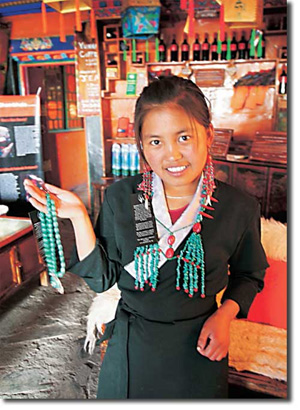 Apr. 9, 2025
Apr. 9, 2025
Weather
American hotel-runner: Tibetan ethnic culture continues developing
2009-08-01 17:14 BJT
By Zhang Mingyu
BEIJING, July 31 (Xinhuanet) -- The Tibetan ethnic culture has been developing continuously. Modernization doesn't mean globalization or Americanization; instead, to be itself is the main principle for Tibet's development by any means, said Laurence Brahm, an old China hand from the United States.

Photo shows Laurence Brahm displaying his collection in his Tibetan-style hotel in Lhasa, capital of southwest China's Tibet Autonomous Region. (Photo Source: tibetculture.net)
It was in 1992 that Laurence paid a visit to Tibet for the first time. His fancy on this snowy plateau began with a deep feeling of its "Big Sky," a popular phrase to describe the vast vault of heaven in the Western United States.
In his words, Tibet's scenic landscape was so breathtaking that it reminded him of the nature-worshipping Indo-American culture with which he was fascinated as a youth.
At the end of 2001, Laurence started his journey traveling around West China, including Tibet, Qinghai and Yunnan. This time, what he acquired in Tibet was far more than the excitement from picturesque natural scenes.
In Tibet's capital of Lhasa, he visited a craft plant where the employees are mainly handicapped. He also visited Tibetan herdsmen's families embarking on prosperity by making dairy and folk handicrafts.

Photo shows the Tibetan-style hotel Shambhala run by Laurence. (Photo Source: tibetculture.net)
"I found such a small sustainable economic development pattern in China's western minority areas has contributed to protecting native ethnic cultures and helped local people tap new sources of income according to local conditions. It's worth learning for those living on both sides of the Himalayas."
With this inspiration, the man launched his business by combining the Tibetan culture and micro-economy and opened a three-storey Tibetan-style hotel called "Shambhala," meaning the most beautiful place in the Tibetan language, near Baglangxoi, downtown Lhasa.
In his eyes, culture and economy are closely linked. He runs the hotel for money of course, yet he would like to offer jobs to local Tibetans in this way. He hopes the Tibetans could apply their cultural traits as a way to achieve a well-off life.

A Tibetan girl employed in the hotel "Shambhala" shows accessories she made on spot. (Photo Source: tibetculture.net)
"Weak economic foundation cannot carry forward culture. Separated from economic reality, the culture has to be left in the museum and let foreigners pay for visiting," Laurence said.
In his hotel, Laurence has set a bar downstairs, where he employed Tibetan girls to make various kinds of original Tibetan carpets and accessories on spot.
"Tibetans have great art creational ability. I just provide them with a platform and proper guidance. They themselves are proud of these self-designed products, too."
For him, the Tibetan culture reflects a particular philosophy abstracted from religion. That is to take people, or even animals and plants as foremost and to emphasize a harmonious society and causal relations.

Photo shows the ornaments in the Shambhala Hotel run by Laurence in downtown Lhasa. (Photo Source: tibetculture.net)
"Lhasa will become China's Mekka, a Mekka with social harmony."
Laurence has made many video clips during his trip to Tibet. In his videos, he was always a hiker carrying a big backpack to explore the myth of "the world's roof" and telling of his story about the Tibetan Buddhism, Tibetan folk customs and hospitable Tibetans.
"I really hope every newcomer may learn as an explorer step by step about the culture and reality in Tibet from my own experience."
Editor: 卢佳颖 | Source: Xinhuanet
 Mail
Mail Share
Share Print
Print


 Video
Video









 2009 China Central Television. All Rights Reserved
2009 China Central Television. All Rights Reserved